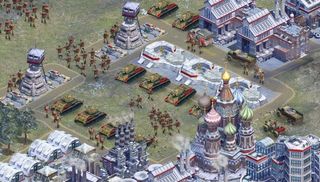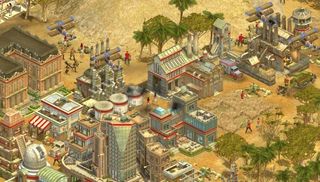Reinstall: Rise of Nations

Reinstall invites you to join us in revisiting classics of PC gaming days gone by. This week, we revisit the mighty RTS, Rise of Nations.
It all begins so peacefully. A vast field of inky darkness, with just one point of light in the middle. Within it, a library stands tall and proud, but with many shelves left empty. Next to it, a few fields are tended by villagers, and a woodcutters' camp stands in a clearing nearby. A scout sits and strokes his pet dog. In the middle of it all stands the town centre, its homes packed with children, waiting to come of age and leave a legacy unmatched by any other civilisation on Earth.
"RoN tries to fit the entire span of human history into your lunch hour"
Rise of Nations attempts something quite audacious: fitting the entire span of human history into your lunch hour. It's real-time, as in 'real-time strategy', but it accelerates that supposedly 'real' time to ludicrous levels, packing the scope of a game of Civilization into an hour without compromising on the detail. You might send a group of hoplites into battle with bronze spears and have them arrive armed with muskets. Imagine the aforementioned Civilization blended with Age of Empires, the Total War series and Red Alert and you're getting close, but Rise of Nations has a few tricks of its own.
The way resource gathering works, for example. Instead of each of your villagers gathering up as much food or wood as their little arms can carry and hauling it back to a supply depot, they contribute to an overall economy. Your resources tick up steadily, adding a certain amount every 30 seconds. Each active woodcutter adds to that rate, but here's the kicker: there's a hard upper limit. Chuck as many woodcutters as you like on that forest, you won't get any more wood if you're above your maximum production efficiency, known as the 'commerce cap'.

That cap is raised in the hallowed halls of your library. By spending resources to research commerce technology you not only boost your commerce cap but also unlock various economic upgrades. That's not the only thing you can research, either: military technology raises your population limit and unlocks unit upgrades, civics technology lets you build more cities and pushes out your national borders, and science technology makes all the other technologies cheaper and reduces the time they take to research.
"Advance through the ages to access the next cluster of wonders."
Every time you climb a rung on all four of the technology tracks, you unlock the ability to advance to the next 'age' – going from antiquity to classical, to medieval, to gunpowder, to the enlightenment, to industrial, to modern, and ending up in the information age. Ages often unlock different resources. Oil doesn't appear on the map until you reach the industrial age, for example. Additionally, you'll need to advance through the ages to access the next cluster of wonders.
Ah yes, wonders. As in Civilization, wonders can be built once per game and give unique benefits to the civilisation that possesses them. The Colossus raises your commerce cap, which gives its builder a sizeable economic advantage in the early game. The Terracotta Army creates a basic foot unit every 30 seconds. The Eiffel Tower doubles oil output, and you can even build a Supercollider to enable you to research technologies instantaneously. But you've got to be careful where you build them – you can only have one per city, and if that city gets captured, you lose its effects.
The biggest gaming news, reviews and hardware deals
Keep up to date with the most important stories and the best deals, as picked by the PC Gamer team.
Most Popular

